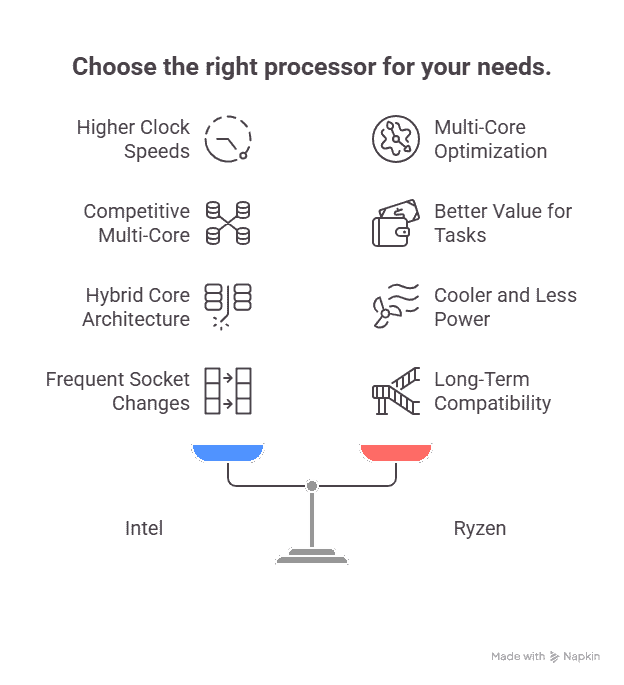When it comes to choosing the best processor for your PC, the battle between Intel and Ryzen is one of the most heated debates in the tech world.
Both brands offer powerful chips that cater to different types of users, from gamers to content creators to professionals handling heavy workloads.
But which one is right for you? Today, we’re breaking down the differences between Intel and Ryzen processors to help you make an informed decision right here on History of Simple Things.

The story of Intel versus Ryzen begins with the long-standing dominance of Intel in the CPU market. For decades, Intel held the crown as the go-to processor brand for desktops and laptops.
Their CPUs were known for their strong single core performance, which made them excellent for gaming and everyday tasks.
However, things started to change in 2017 when AMD released its Ryzen processors, shaking up the market and giving consumers a viable alternative to Intel’s reign.
Ryzen processors brought something new to the table, more cores and threads at a lower price. This was a gamecher for multitasking and productivity.
While Intel was still holding on to its advantage in gaming performance, Ryzen quickly became the preferred choice for video editing, 3D rendering, and other CPU inensive tasks.
The introduction of AMD’s Zen architecture proved that Ryzen was not just a budget option, but a serious competitor. Fast forward to today and the competition is tighter than ever. Intel’s latest core processors have improved significantly, bringing better efficiency, and competitive multi-core performance.
Meanwhile, Ryzen continues to innovate, pushing the limits with high core counts, better power efficiency, and support for the latest technologies.AMD’s Zen 4 and Intel’s 13th and 14th gen processors are making it harder than ever to choose between the two.
For gamers, the choice between Intel and Ryzen can be tricky. Intel chips traditionally excel in gaming due to their higher clock speeds and optimized single core performance. This means games that rely on fewer cores but demand high speeds tend to perform better on Intel.
However, Ryzen has closed the gap significantly with its latest CPUs offering impressive gaming performance while also handling streaming and background tasks smoothly. Many modern games are now optimized for multiple cores, allowing Ryzen’s higher core counts to shine.
If you’re a content creator, Ryzen processors tend to offer better value.With more cores and threads, they handle video editing, animation, and rendering more efficiently. Intel has made strides in this area, but Ryzen’s higher core counts still give it an edge in workloads that rely on parallel processing.
The presence of AMD’s 3DV cache in some Ryzen models also enhances certain workloads like video encoding and game performance. One key difference between Intel and Ryzen is how they handle power and heat.
Ryzen CPUs generally run cooler and consume less power, making them a great choice for energy conscious users. Intel processors while powerful can generate more heat requiring better cooling solutions especially in high performance models.
However, Intel’s latest hybrid core architecture which combines performance and efficiency cores has helped reduce power consumption in certain scenarios. Another major factor to consider is motherboard compatibility.
Intel frequently changes its socket types, meaning upgrading to a newer Intel CPU may require a new motherboard. Ryzen, on the other hand, has maintained compatibility with older AM4 motherboards for several generations, allowing users to upgrade their CPUs without needing to change their entire system.
The introduction of AMD’s AM5 socket now means a shift, but AMD has promised long-term support for this platform. Price is also a deciding factor. AMD has built a reputation for offering more performance per dollar, making Ryzen CPUs an attractive choice for budget conscious buyers.
Intel, however, has responded by adjusting its pricing strategy, offering more competitive options in recent years. For high-end processors, the price difference has narrowed, but in the mid-range and budget segments, Ryzen still provides excellent value.
For gamers who prioritize raw gaming performance with high frame rates, Intel’s high clock speeds might give them the edge. However, Ryzen’s 3DV cache models offer exceptional gaming performance as well, making it a strong contender for competitive and immersive gaming.
If you’re a content creator, Ryzen’s higher core and thread counts make it an excellent choice for video editing, 3D rendering, and streaming. Intel’s high-end chips can also compete, but Ryzen tends to provide better value for these tasks.
For general use and productivity, both Intel and Ryzen offer great mid-range processors that handle browsing, office work, and multitasking with ease. If power efficiency is a priority, Ryzen may be the better choice.
When it comes to workstations, if you need a high performance setup for engineering, scientific computing, or server tasks, AMD’s Thread Ripper series and Intel’s Xeon processors cater to these needs with powerful multi-threaded performance.
Looking ahead, the future of Intel versus Ryzen is even more exciting. Intel is working on further optimizing its hybrid architecture while AMD is focusing on increasing efficiency and improving cache technology.
Both brands are also preparing for a future of AIdriven workloads, meaning the next generations of CPUs will likely incorporate AI based optimizations for even better performance.
Ultimately, both Intel and Ryzen have their strengths, and the best choice depends on your specific needs. Whether you’re building a gaming rig, a workstation, or a general use PC, knowing what each brand offers can help you make the best decision for your setup. Thank you for watching.
If you have suggestions for our next blog, feel free to share them in the comments below. We’ll be sure to give you an acknowledgement for your contribution. Thank you for joining us on this journey through the history of simple things. Don’t forget to like, comment, and stay tuned for more stories woven through the smallest details



